39 how to read fats on food labels
Fat Content on Food Labels - Reading Between the Lines The Mayo Foundation continued, "Still, you may be able to tell if a product contains trans fat, even if it's not directly listed on the food label. Look for the words ' hydrogenated ' or 'partially hydrogenated' in the list of ingredients. These terms indicate that the product contains trans fat. Easy Guide to Understanding Food Labels When You Have High ... - MyDoc Ideally, best to get 0 grams of this per day. Keep in mind that manufacturers can list their products as 0 grams if it has less than 0.5 grams of trans fat per serving. This means that your food may contain trans-fat even if the food label says 0 gram. Therefore it's important to check the ingredient list (more on this later).
5 foods with a surprising amount of sugar | Kaiser Permanente Sugary beverages, like soda, sports drinks, and certain fruit juices, are the number one source of added sugar in Americans' diets. 5 Many fruit juices, and even some types of applesauce, are made with fruit juice concentrate. That means the water has been removed from the fruit, leaving mostly sugar behind. Plus, it doesn't contain any of ...

How to read fats on food labels
How to Read the Nutrition Facts Label on Packaged Foods - WebMD American Association of Clinical Endocrinologists: "Learning to Read a Food Label." ... Fat-Fighting Foods . Slideshow 25 Low-Calorie Snacks . Slideshow High-Protein Diets . Interpreting Total Fat and Types of Fat on Food Labels - Nina Cherie ... Determining the type of fat can help you decide whether or not a food is rich in 'healthy' and/or 'unhealthy' fats. Trans fats and, in some cases saturated fats, are considered "unhealthy" or "bad" while monounsaturated and polyunsaturated (omega-3) fats are generally healthier alternatives or "good" fats. Understanding Food Nutrition Labels | American Heart Association 1 - Start with the serving information at the top. This will tell you the size of a single serving and the total number of servings per container (package). 2 - Next, check total calories per serving and container. Pay attention to the calories per serving and how many calories you're really consuming if you eat the whole package.
How to read fats on food labels. How to read food labels for fat? - YouTube Check my website: !!!! The most of the people hear the word fat and get scared. The only thing that comes to mind... How To Read a Nutrition Label for Bariatric Surgery & Weight Loss STEP. 3. Determine the calories that are provided by that one serving. If you plan on eating more than one serving, then the calories will be greater than the label, and you will need to multiply all the information by the number of servings you are actually consuming. Your total number of calories per day will vary. safefood | How to read food labels How do I know if a food is low, medium or high in fat, saturated fat, sugar and salt? Some labels use colour coding to show at a glance if a food is high, medium or low in fat, saturated fat, sugar and salt. Low (green) - the best choice Medium (amber) - okay most of the time High (red) - only choose occasionally. If the label isn't colour ... Reading food labels: Tips if you have diabetes - Mayo Clinic Put sugar-free products in their place. Sugar-free doesn't mean carbohydrate-free. Sugar-free foods may play a role in your diabetes diet, but remember that it's equally important to consider carbohydrates as well. A sugar-free label means that one serving has less than 0.5 grams of sugar. When you're choosing between standard products and ...
Food Label Detective: How to Spot the Good Fats Bad. All fats are not created equal. Dietary fat can be broken down into the "good," monounsaturated fat and polyunsaturated fat, and the "bad," trans fat and saturated fat. Good fats are a necessary part of a healthy, well-balanced diet. Monounsaturated fats are found primarily in plant-based oils like olive and canola, and nuts and seeds. 3 Ways to Read Nutrition Facts on Food Labels - wikiHow Life 9. Know that 5% of a daily value per serving is low and 20% is high. When it comes to nutrients, 5% or less is considered low and 20% or higher is considered high. This means that an item that lists its fat content at 4% can be considered to be low fat. Food Labels: Fat & Cholesterol | Home & Garden Information Center The Nutrition Facts label shows you how much fat is in a product, even if the fat is hidden as an ingredient. The serving size and the nutrients listed on this label are consistent, which makes it easy to compare similar products without any calculations. % Daily Values (% DVs) are listed in a column on the "Nutrition Facts" label. How to Read Nutrition Labels: Fat Content, Carbs & What To Look For Nutrition labels are required to include total fat, saturated fat, and trans fat. The total amount of fat in the diet is a percentage of your calorie needs. The recommendation for the typical American diet is around 30%. For someone taking in 2,000 calories, this would mean around 70 grams of total fat per day.
How to Read a Food Label & How to Find Unhealthy Hidden Ingredients If the food label has partially hydrogenated oil in it, it has trans fat. Foods that commonly contain partially hydrogenated oils are baked goods, fried foods, snacks and creamer and margarine (13). Avoid any products that list one of these ingredients " partially hydrogenated ," " fractionated ," " shortening " or " hydrogenated ". Food labels - NHS Front-of-pack labels usually give a quick guide to: energy fat content saturated fat content sugars content salt content These labels provide information on the number of grams of fat, saturated fat, sugars and salt, and the amount of energy (in kJ and kcal) in a serving or portion of the food. How to Understand and Use the Nutrition Facts Label | FDA Nutrients to get less of: Saturated Fat, Sodium, and Added Sugars. Saturated fat, sodium, and added sugars are nutrients listed on the label that may be associated with adverse health effects... How to Read Food Labels for Fats and Oils A Note on Ingredient Lists Fats and oils can come from many sources, like animal fats, fish, seeds, plants, and nuts. Reading the ingredient lists on products will reveal the source of the fat. For oils and fats ingredient lists, fats and oils are referred to by their common names (e.g., "beef fat," "cottonseed oil").
How to read food labels | healthdirect what ingredients it contains (listed in order from largest to smallest by weight) nutritional information (such as average amount of energy, fat, protein, sugars and salt) percentage labelling (how much of the main ingredients it contains, so you can compare it to other products) use-by or best-before date details of the manufacturer
This Is How to Read a Nutrition Facts Label on the Keto Diet Since the 1990s, some changes have been made, including which nutrients manufacturers must clearly list on labels. [ *] Nutrients like vitamin A and vitamin C are no longer required, while vitamin D, potassium, "added sugars," and trans fats must appear on labels [ * ].
Reading Food Labels (for Parents) - Nemours KidsHealth This number indicates how much fat is in a single serving of food. Although too much fat can lead to health problems, our bodies do need some fat every day. Fats are an important source of energy — they contain twice as much energy per gram as carbohydrates or protein. Fats provide insulation and cushioning for the skin, bones, and internal organs.
How to Read Nutrition Facts Labels the Right Way - GoodRx Nutrition Facts labels are required to list the total fat, saturated fat, and trans fats on packaged food products. It's important to choose foods with the right kinds of fats. Here are the differences between the fats you'll see on the label. Bad fats Saturated and trans fats are the less healthy types of fats.
How To Read Food Labels - 10 Tips - Pritikin Weight Loss Resort 8. Check the types of fat. Make sure there are no saturated fats, partially hydrogenated fats, or tropical oils in the ingredient list, including lard, butter, coconut, cocoa butter, palm oils, shortening, margarine, chocolate, and whole and part-skim dairy products. They're all damaging to your arteries and heart.
How to Read Everything on the Nutrition Facts Label - Food Network Bottom line: When looking at the fat breakdown of the food, aim for those with no trans fat, a minimal amount of saturated fat, and more mono- and poly-unsaturated fats to promote heart health. Sodium
Learning To Read Labels :: Diabetes Education Online On a nutrition food label, subtract the fiber from the total carbohydrate amount. When you read food labels, the grams of sugar are already included in the total carbohydrate amount, so you do not need to count this sugar amount separately. The grams of sugar listed include both natural sugars, from fruit or milk, and added sugars.
How to Read Food Labels Without Being Tricked - Healthline This label usually means that the fat has been reduced at the cost of adding more sugar. Be very careful and read the ingredients list. Low-carb. Recently, low-carb diets have been linked to...
How To Read Food and Beverage Labels - National Institute on Aging How to read the Nutrition Facts label The U.S. Food and Drug Administration (FDA) requires a Nutrition Facts label on most packaged foods and beverages. At the top of the Nutrition Facts label, you will find the total number of servings in the container and the food or beverage's serving size.
Food Labels | CDC - Centers for Disease Control and Prevention Check the Serving size first. All the numbers on this label are for a 2/3-cup serving. This package has 8 servings. If you eat the whole thing, you are eating 8 times the amount of calories, carbs, fat, etc., shown on the label. Total Carbohydrate shows you types of carbs in the food, including sugar and fiber.
How to read food labels: MedlinePlus Medical Encyclopedia If a food has these fats, the amount will be listed on the label under total fat. They are measured in grams. Look for foods that have no trans fats or are low in them (1 gram or less). Sodium is the main ingredient of salt. This number is important for people who are trying to get less salt in their diet.
Reading Cat Food Labels: Ingredients, Nutrition, and More - WebMD Guaranteed analysis: States the minimum or maximum amount of certain nutrients, including protein, fat, and fiber. Nutrients are different from ingredients. Feeding directions: Explains how to feed the product to the cat. Such directions are to be considered general guidelines, not rules. Ask your veterinarian for specific instructions.
Understanding Food Nutrition Labels | American Heart Association 1 - Start with the serving information at the top. This will tell you the size of a single serving and the total number of servings per container (package). 2 - Next, check total calories per serving and container. Pay attention to the calories per serving and how many calories you're really consuming if you eat the whole package.
Interpreting Total Fat and Types of Fat on Food Labels - Nina Cherie ... Determining the type of fat can help you decide whether or not a food is rich in 'healthy' and/or 'unhealthy' fats. Trans fats and, in some cases saturated fats, are considered "unhealthy" or "bad" while monounsaturated and polyunsaturated (omega-3) fats are generally healthier alternatives or "good" fats.
How to Read the Nutrition Facts Label on Packaged Foods - WebMD American Association of Clinical Endocrinologists: "Learning to Read a Food Label." ... Fat-Fighting Foods . Slideshow 25 Low-Calorie Snacks . Slideshow High-Protein Diets .
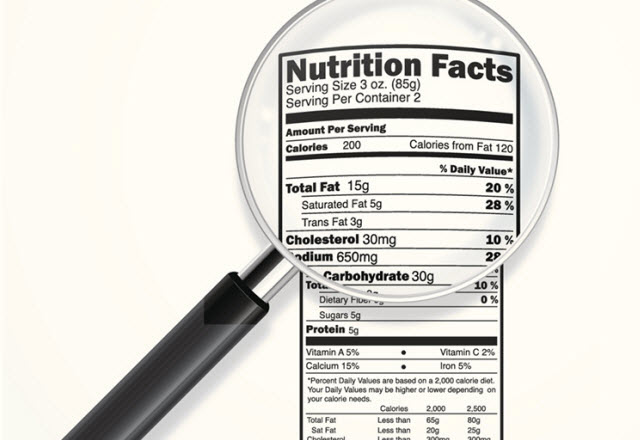
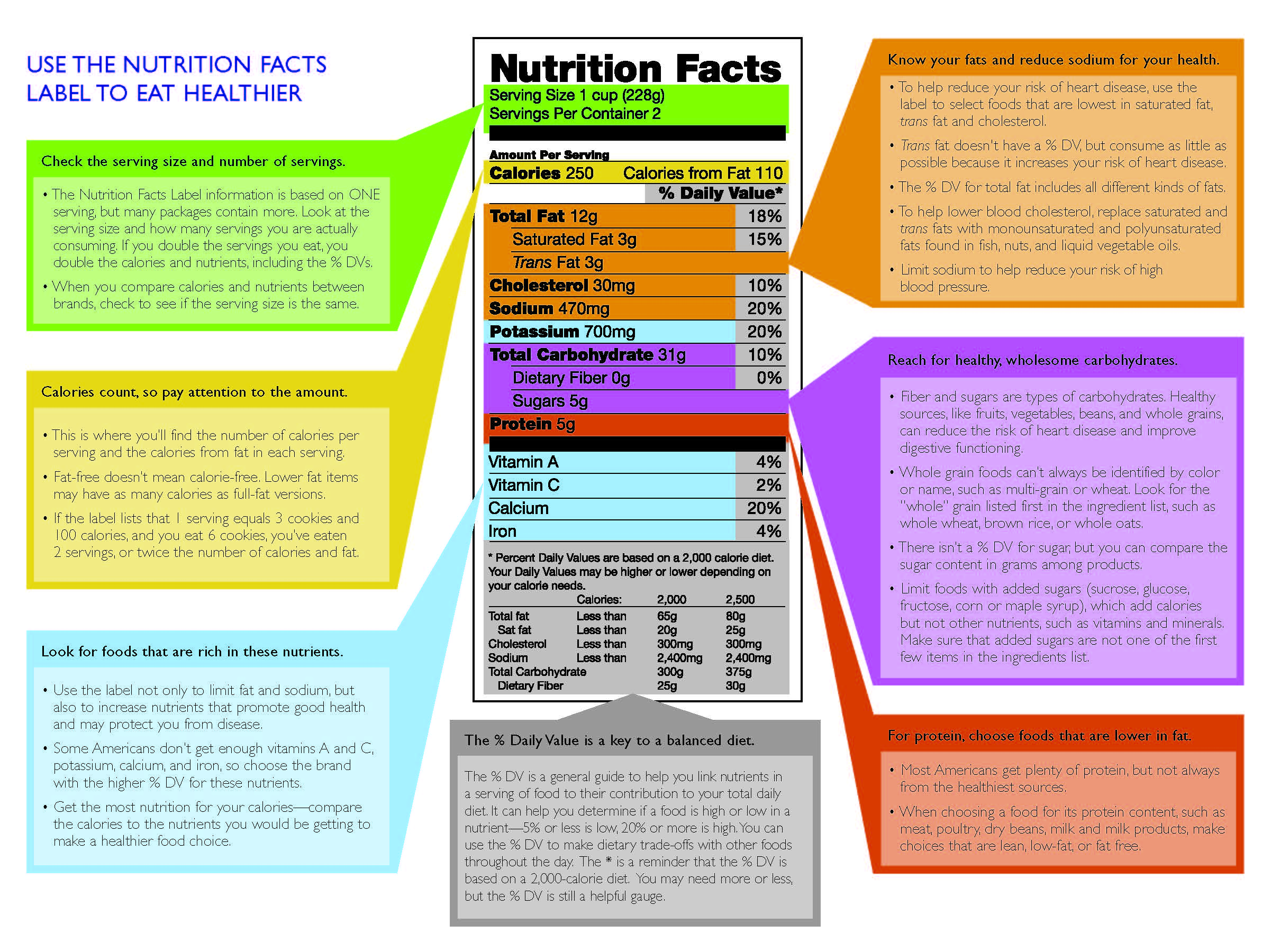

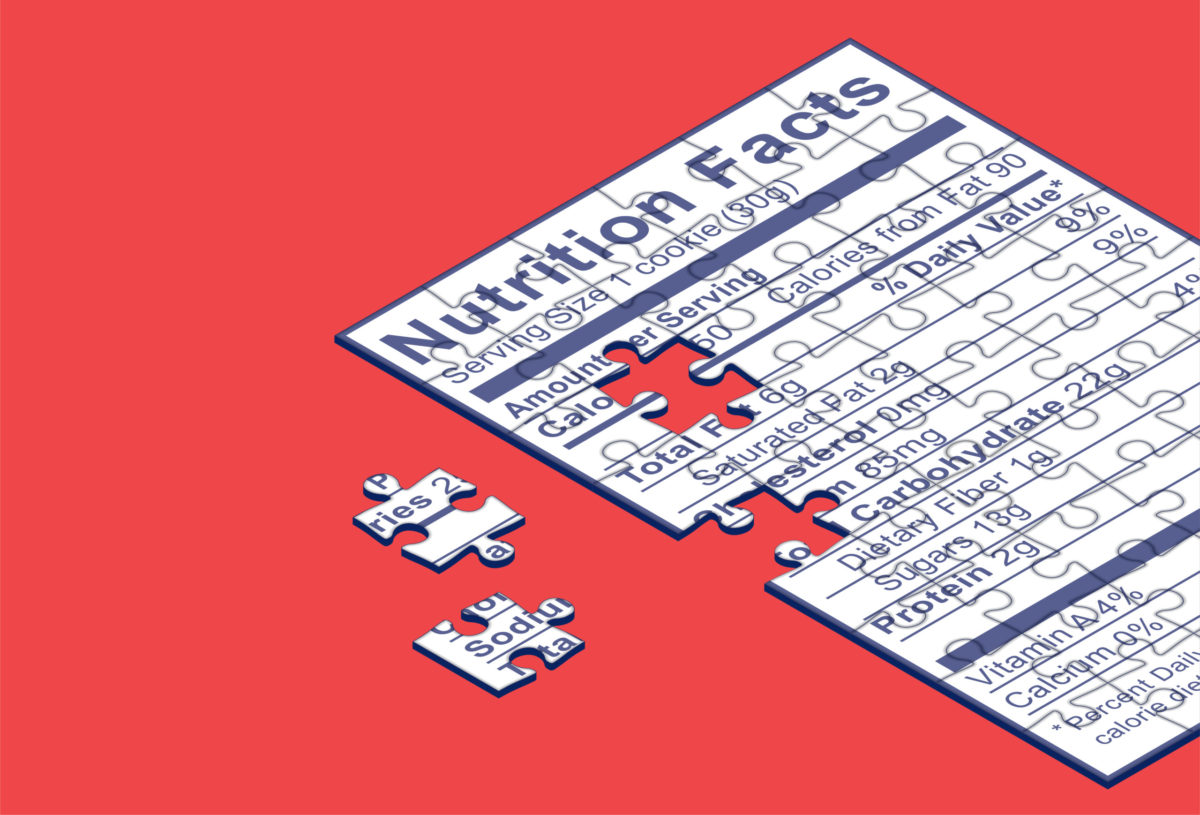
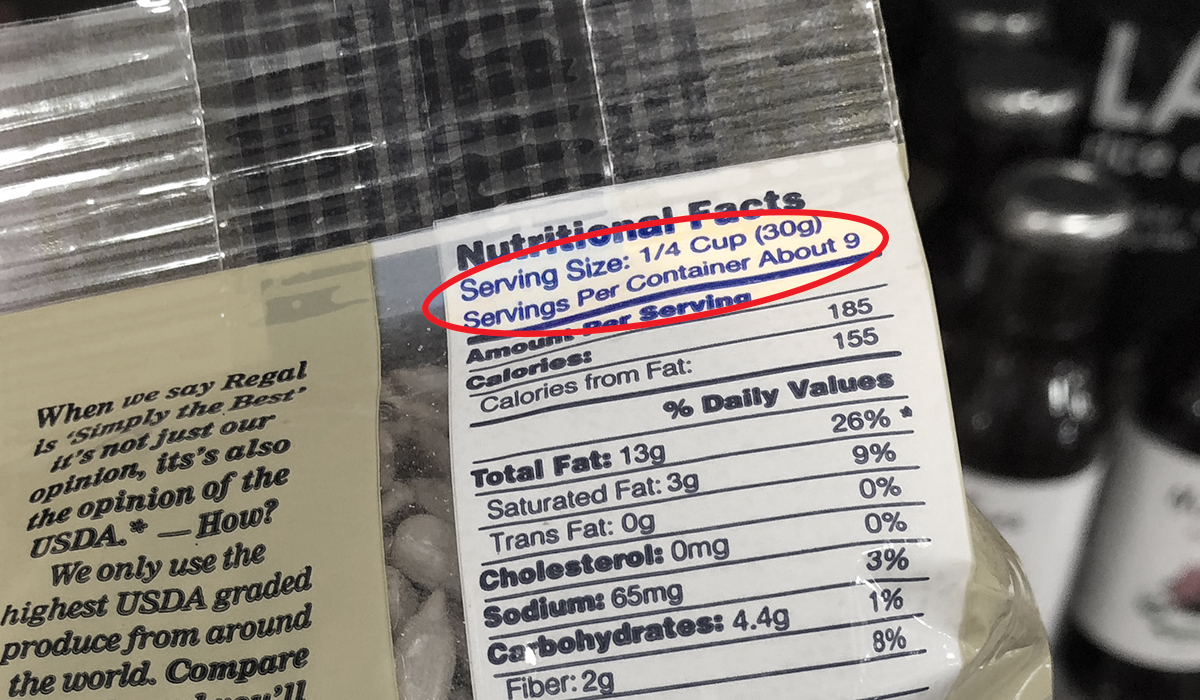

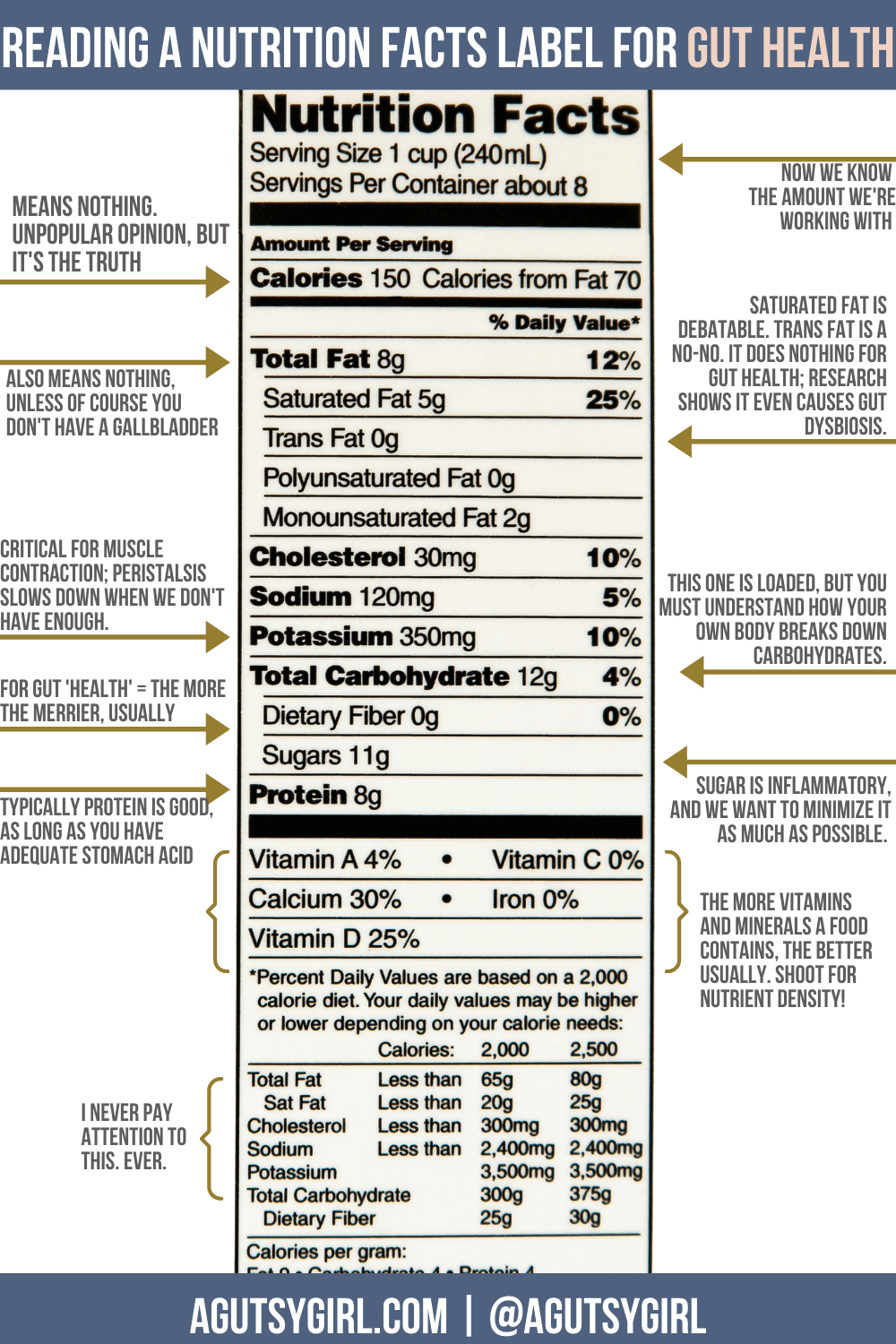





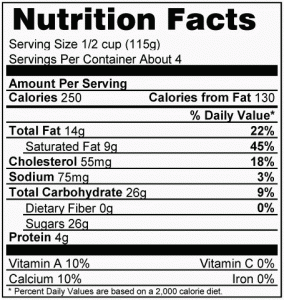

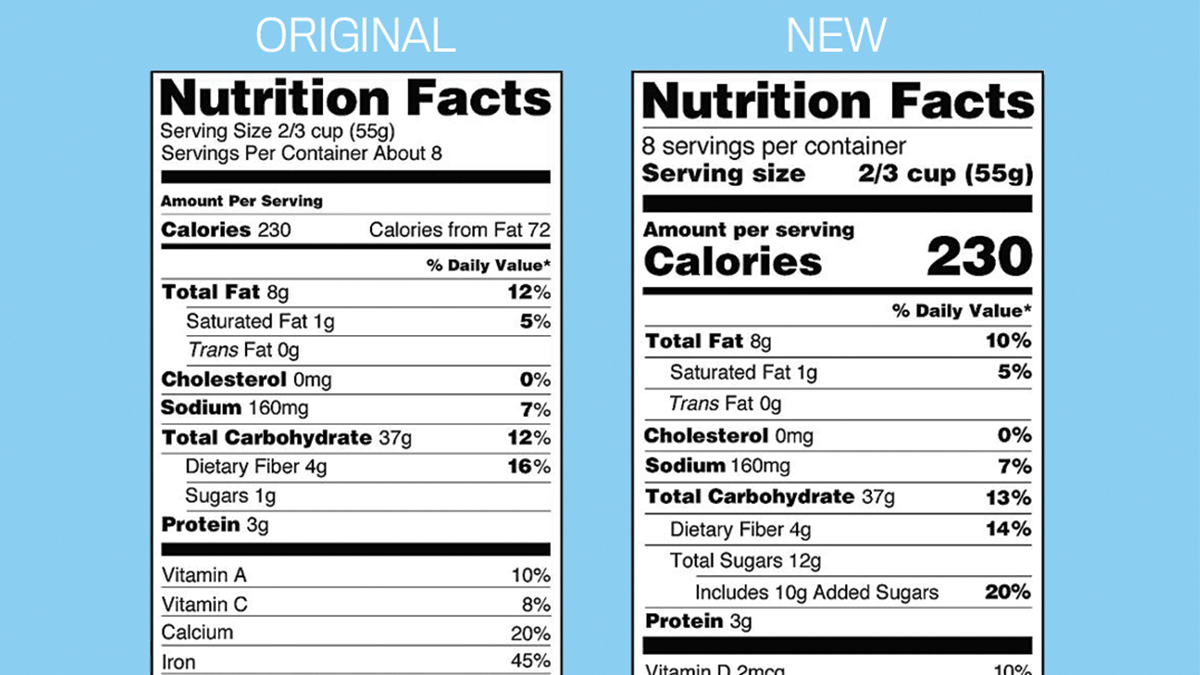
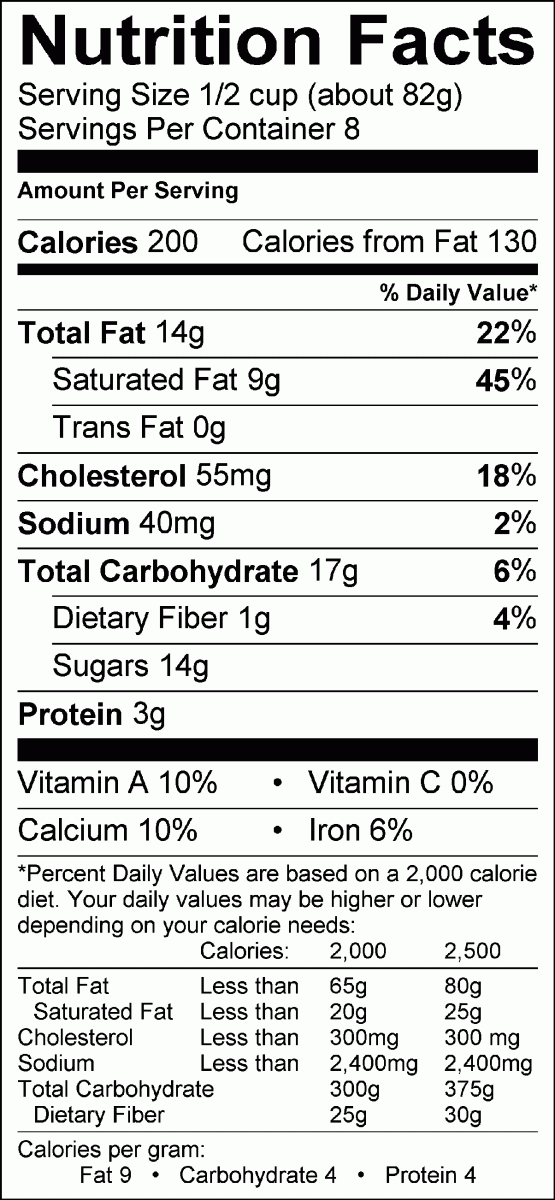
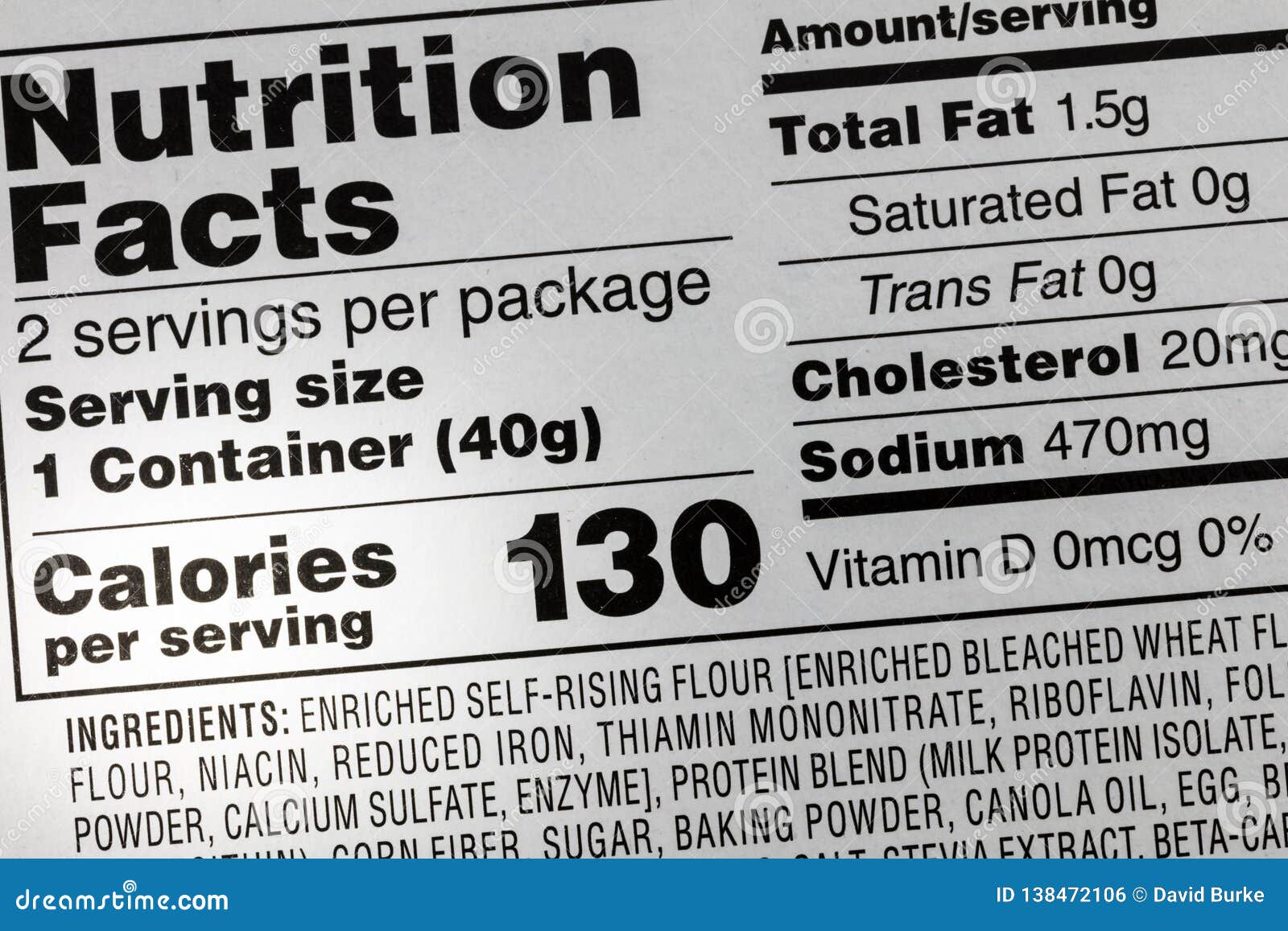
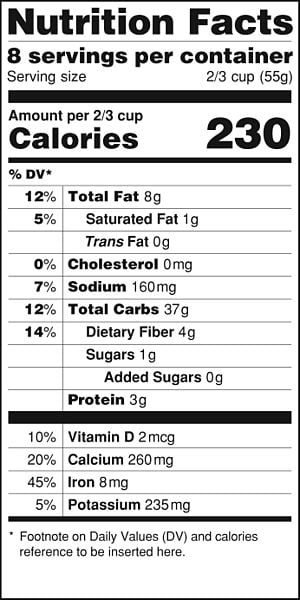
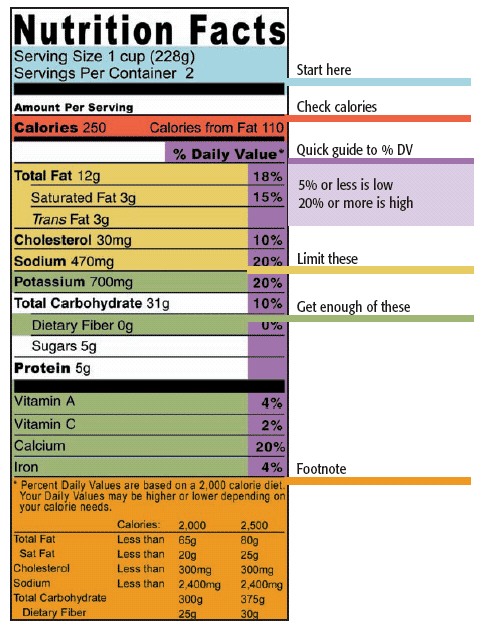

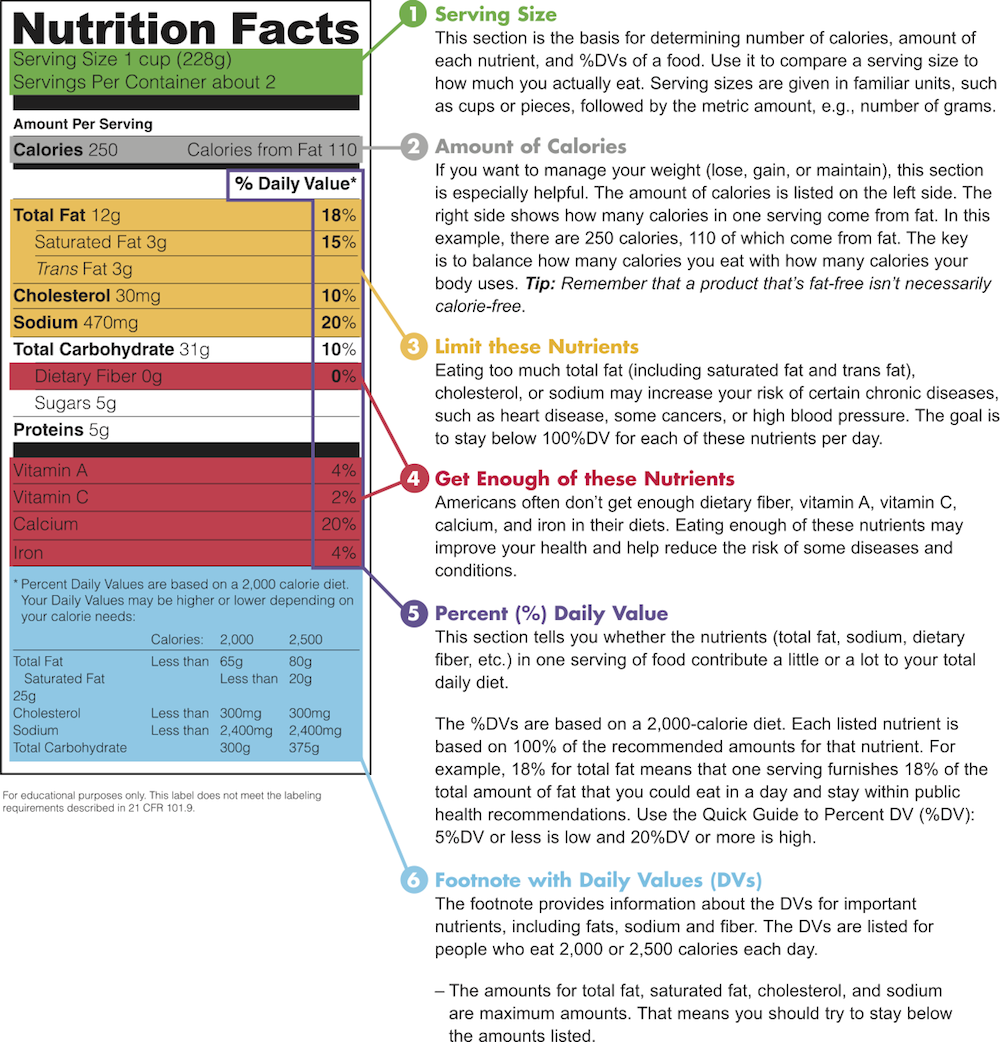


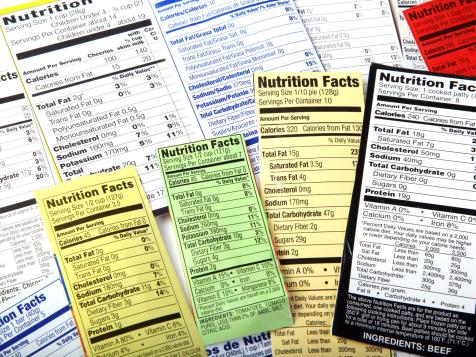
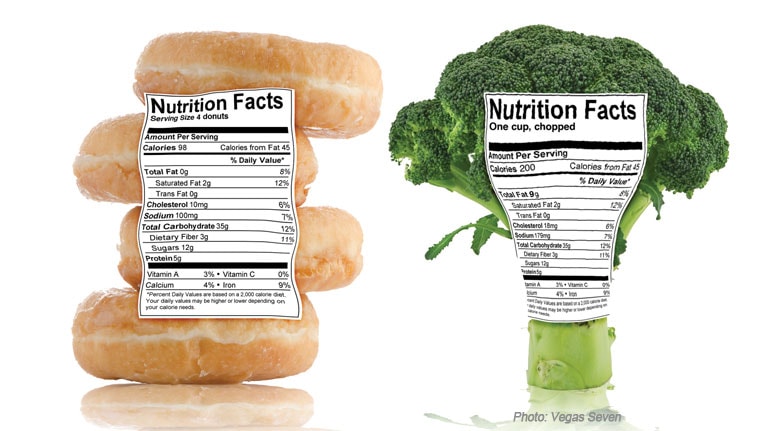
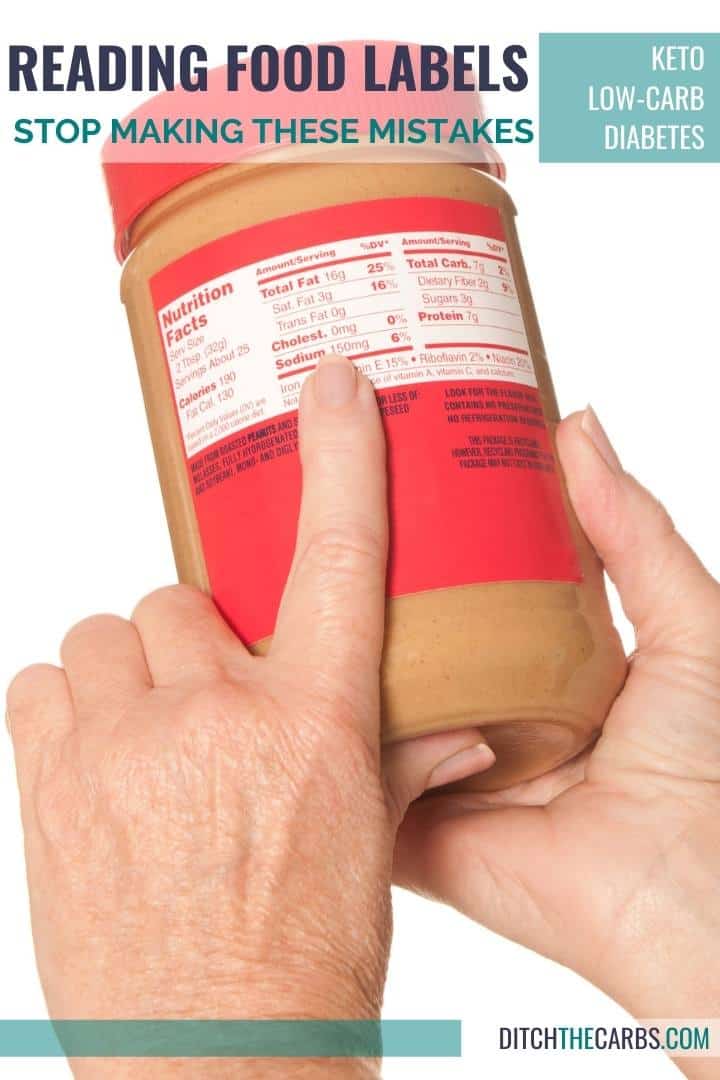
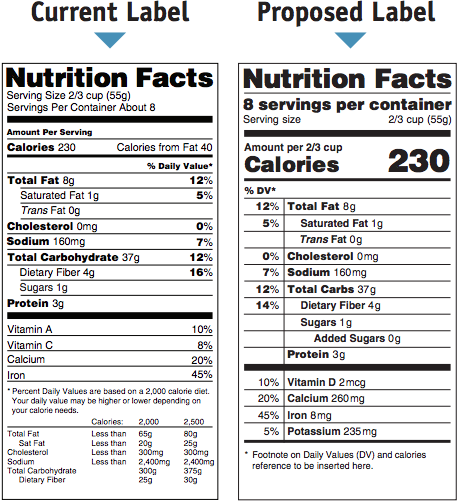



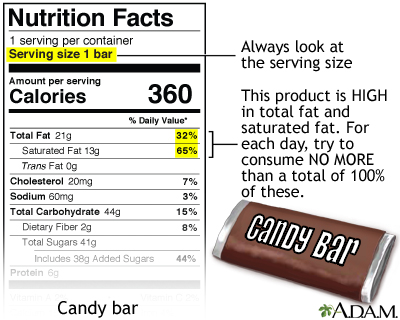

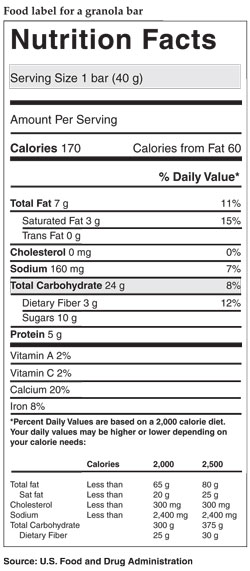

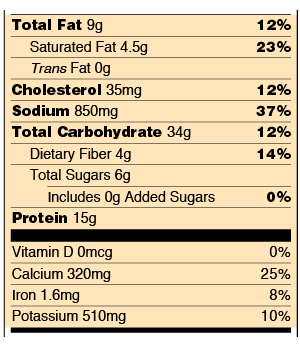

Post a Comment for "39 how to read fats on food labels"